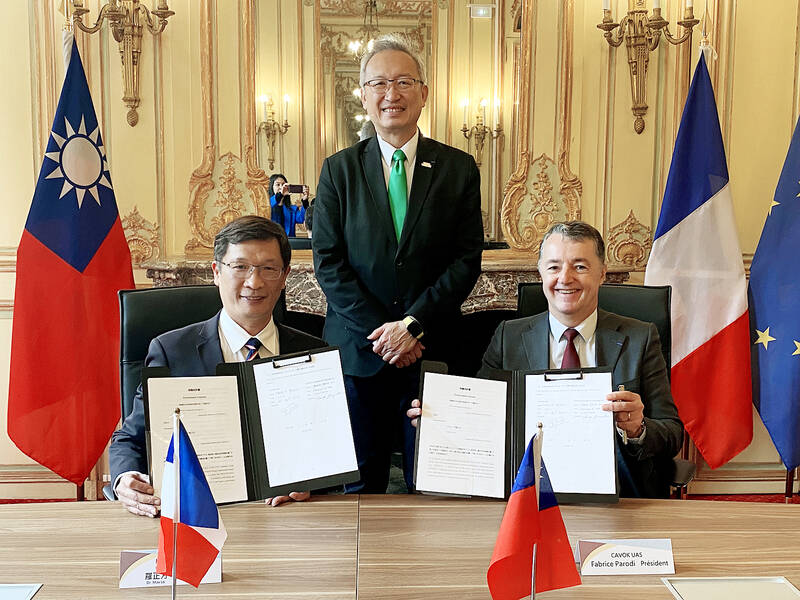Taiwan’s Geosat Aerospace & Technology Inc and France’s Cavok UAS have signed an agreement to develop “China-free” drones, which the companies said would meet the needs of customers in democratic countries.
During a signing ceremony at the Taipei Representative Office in France on Monday last week, Geosat said they plan to develop long-range drones capable of vertical takeoff and landing for military and commercial users.
The planned drone, codenamed CK50-T, would be capable of performing airborne and maritime intelligence, surveillance and reconnaissance missions, the firms said.

Photo: CNA
Cavok CEO Fabrice Parodi said he hopes the agreement would pave the way for further cooperation, as his company intends to build a production line in Taiwan and extend its reach in the Asia-Pacific region.
Production of the first drone under the partnership would be led by Cavok and take place in France with assistance from Geosat employees, Geosat chairman Lo Cheng-fang (羅正方) said.
The teams would obtain necessary certificates adopting international standards before introducing the drone to the global market, Lo said.
The teams would also meet in Taiwan to set up system integration and assembly for a subsequent drone, Lo said, adding that the plan is to mass produce the drones in Taiwan.
Taiwan is better than China for drone manufacturing thanks to its quality production capabilities, cross-industry business clusters and respect for intellectual property rights, Lo said.
Cavok wants to avoid becoming dependent on Chinese supply chains, Lo said, adding that more countries are exploring Taiwan as an alternative drone production center to Shenzhen, China.
Lo said that Taiwan is also better positioned as a drone manufacturing base than Southeast Asian countries, which offer cheaper labor, but trail behind in terms of maturity of chip and software engineering sectors.

‘DENIAL DEFENSE’: The US would increase its military presence with uncrewed ships, and submarines, while boosting defense in the Indo-Pacific, a Pete Hegseth memo said The US is reorienting its military strategy to focus primarily on deterring a potential Chinese invasion of Taiwan, a memo signed by US Secretary of Defense Pete Hegseth showed. The memo also called on Taiwan to increase its defense spending. The document, known as the “Interim National Defense Strategic Guidance,” was distributed this month and detailed the national defense plans of US President Donald Trump’s administration, an article in the Washington Post said on Saturday. It outlines how the US can prepare for a potential war with China and defend itself from threats in the “near abroad,” including Greenland and the Panama

A wild live dugong was found in Taiwan for the first time in 88 years, after it was accidentally caught by a fisher’s net on Tuesday in Yilan County’s Fenniaolin (粉鳥林). This is the first sighting of the species in Taiwan since 1937, having already been considered “extinct” in the country and considered as “vulnerable” by the International Union for Conservation of Nature. A fisher surnamed Chen (陳) went to Fenniaolin to collect the fish in his netting, but instead caught a 3m long, 500kg dugong. The fisher released the animal back into the wild, not realizing it was an endangered species at

The High Prosecutors’ Office yesterday withdrew an appeal against the acquittal of a former bank manager 22 years after his death, marking Taiwan’s first instance of prosecutors rendering posthumous justice to a wrongfully convicted defendant. Chu Ching-en (諸慶恩) — formerly a manager at the Taipei branch of BNP Paribas — was in 1999 accused by Weng Mao-chung (翁茂鍾), then-president of Chia Her Industrial Co, of forging a request for a fixed deposit of US$10 million by I-Hwa Industrial Co, a subsidiary of Chia Her, which was used as collateral. Chu was ruled not guilty in the first trial, but was found guilty

DEADLOCK: As the commission is unable to forum a quorum to review license renewal applications, the channel operators are not at fault and can air past their license date The National Communications Commission (NCC) yesterday said that the Public Television Service (PTS) and 36 other television and radio broadcasters could continue airing, despite the commission’s inability to meet a quorum to review their license renewal applications. The licenses of PTS and the other channels are set to expire between this month and June. The National Communications Commission Organization Act (國家通訊傳播委員會組織法) stipulates that the commission must meet the mandated quorum of four to hold a valid meeting. The seven-member commission currently has only three commissioners. “We have informed the channel operators of the progress we have made in reviewing their license renewal applications, and